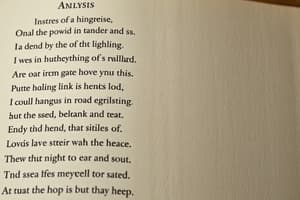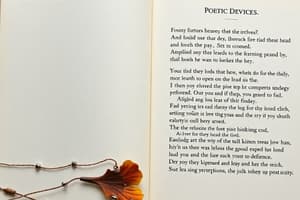Podcast
Questions and Answers
What is the structure of a poem?
What is the structure of a poem?
The structure of a poem includes its form, rhythm, rhyme scheme, and type of poetry.
What are the structural elements of poetry?
What are the structural elements of poetry?
Rhythm, meter, rhyme scheme, and form.
What defines a villanelle?
What defines a villanelle?
A villanelle consists of 19 lines, with five tercets followed by a quatrain.
What does the term 'in medias res' mean?
What does the term 'in medias res' mean?
What is a flashback?
What is a flashback?
How does Shakespeare create tension near the end of his plays?
How does Shakespeare create tension near the end of his plays?
What is an example of 'in medias res' in Hamlet?
What is an example of 'in medias res' in Hamlet?
What is the rhyme scheme in poetry?
What is the rhyme scheme in poetry?
How can an author use the form of poetry and drama to support their message?
How can an author use the form of poetry and drama to support their message?
What is the term for depicting an event that occurred out of the timeline in a play?
What is the term for depicting an event that occurred out of the timeline in a play?
What technique do poets like William Shakespeare use to build suspense in the final act?
What technique do poets like William Shakespeare use to build suspense in the final act?
Flashcards are hidden until you start studying
Study Notes
Structure of a Poem
- Poetic structure includes a poem's form, rhythm, rhyme scheme, and classification (type of poetry).
- Form refers to the number of lines and overall organization of the poem.
Structural Elements of Poetry
- Rhythm: The pattern of beats or syllables; iambic rhythm consists of unstressed-stressed syllable pairs.
- Meter: Describes how rhythm and line length combine; for example, iambic pentameter has five iambs per line.
- Rhyme Scheme: A pattern of rhyming words at the end of lines; an example is ABAB, where lines 1 and 3 rhyme, as do lines 2 and 4.
- Form: Includes length and the division into stanzas or sections; quatrains consist of four-line stanzas.
Villanelles
- A villanelle contains 19 lines structured as five tercets followed by a quatrain.
- The first and third lines of the initial tercet are alternated as the last lines in the following stanzas.
- The final stanza repeats the first and third lines.
- The strict rhyme scheme is ABA for the tercets and ABAA for the quatrain.
In Medias Res
- This Latin term means "in the middle of things," where a narrative begins in the midst of action, requiring the audience to piece together prior events.
- Example: In "Hamlet," the play starts with Hamlet mourning his father's death.
Flashback
- A flashback reveals scenes that occurred earlier in the narrative.
- In "Hamlet," a true flashback is not used, but an illustrative scene from Hamlet's childhood would represent one if it existed.
Scene Length
- Shakespeare often employs shorter scenes in the final act to heighten tension and suspense.
- This technique enhances audience engagement through dynamic pacing.
Examples in Context
- The initial portrayal of Hamlet's despair over his father's death exemplifies in medias res.
- Rhyme schemes are methods to influence rhythm and emphasize ideas in poetry.
- Authors can manipulate the arrangement of lines and stanzas to reinforce their messages effectively.
- Flashbacks facilitate glimpses into previous events, enriching the narrative's depth.
- Shorter scenes in the final act are a common technique to build suspense, utilized by Shakespeare and other playwrights.
Studying That Suits You
Use AI to generate personalized quizzes and flashcards to suit your learning preferences.



